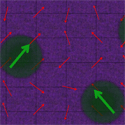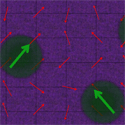Balance excludes magnetism
It is well known that at finite temperature, spontaneous ordering is not possible in low-dimensional systems, such as a lattice chain of spins. Pioneering work in the 1960s by Mermin and Wagner ruled out both magnetic ordering in 1D and 2D quantum spin systems with an isotropic (Heisenberg) interaction between the spins. There are, however, other interactions, such as the Ruderman-Kittel-Kasuya-Yosida interaction (RKKY), in which the conduction electrons mediate an interaction between spins. These interactions are long-ranged and hence not covered by the Mermin-Wagner theorem. Theoretical work has shown ordering is not possible in 1D RKKY systems, but nothing similar has yet been attempted for the 2D case.
Writing in Physical Review Letters, Daniel Loss from the University of Basel, Switzerland, and his collaborators address the 2D case for both Heisenberg and RKKY interactions. They also consider the influence of two contributions to the spin-orbit Hamiltonian of the spin system—the Rashba and Dresselhaus effects. Since both these spin-orbit interactions break the symmetry of the spin interaction, their presence means magnetic order cannot be excluded, except for the special case in which the Rashba and Dresselhaus contributions are of equal magnitude. Because the Rashba spin-orbit interaction can be electrically tuned to match the Dresselhaus interaction, this opens up possibilities for tuning magnetic order electrically. – Daniel Ucko





